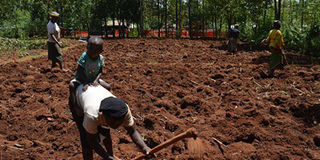Big Four front and centre of state spending as CS reads budget

Small-scale farmers till their land in Ikolomani, Kakamega County, on March 1, 2017. Food security is part of the Big Four agenda. PHOTO | FILE | NATION MEDIA GROUP
What you need to know:
Budget gives Big 4 priority as state races against time to hook the legacy projects
Government will spend some Sh450 billion on healthcare, housing, manufacturing and food security in a a bid to secure President Kenyatta’s legacy projects
Theoretically, the President still has three budget cycles (2019/2020, 2020/2021, 2021/2022) within which to push and deliver on his legacy projects.
Realistically, however, he only has two cycles, given that his last financial year will be heavy on the cost of the 2022 election.
After its first budget for implementing the Big Four development blueprint failed to deliver on key thematic areas, the Jubilee administration has unveiled yet another funding plan representing 14.6 per cent of the 2019/20 budget.
A total of Sh450 billion will be pumped into the Big Four agenda, whose pillars are increasing the manufacturing sector’s share of Gross Domestic Product to 15 per cent by 2022, enhancing food security, Universal Health Coverage and providing affordable and decent housing to all Kenyans, with at least 500,000 new houses by 2022.
Theoretically, the President still has three budget cycles (2019/2020, 2020/2021, 2021/2022) within which to push and deliver on his legacy projects. Realistically, however, he only has two cycles, given that his last financial year will be heavy on the cost of the 2022 election.
Affordable housing
The housing pillar has been beset by legal and technical challenges, which culminated in a Nairobi court suspending the implementation of a 1.5 per cent levy that was to be deducted from workers’ salaries towards the National Housing Development Fund.
Critics have also questioned the rationale of the government building houses for the public, a task that is usually left to the private sector.
In CS Henry Rotich’s budget proposals, the Treasury allocated Sh10.5 billion for social housing and construction of affordable housing units, including those for the police and Prisons Departmemt. Included also is Sh2.3 billion for the Public Servants Housing Mortgage Scheme and Sh5 billion for the National Housing Development Fund, as contributions by the government for its employees.
UHC
For the health sector, imperatives to achieve Universal Health Coverage (UHC) have for the past three years included the need to mobilise adequate resources, increase investments in primary healthcare and reform key institutions such as the National Hospital Insurance Fund (NHIF) to align them with the UHC agenda.
In the budget, UHC has been allocated Sh47.8 billion. This is a shortfall of the projections set under the Meditum Term Plan III (2018-2022), which set out an indicative budget of Sh82.8 billion for health.
Food Security
To achieve food security, the government aims to increase maize production from the current 40 million bags to 67 million and potatoes from 1.6 million tonnes to 2.5 million tonnes by 2022.
Agriculture has been allocated Sh2 billion for the National Value Chain Support Programme and Sh3 billion for setting up the Coffee Cherry Revolving Fund to implement prioritised reforms in the coffee sub-sector.
Other provisions include Sh1 billion for crop diversification and to revitalise the Miraa industry, Sh800 million for the rehabilitation of Fish Landing Sites and Sh700 million for small-holder dairy commercialisation.
Irrigation projects, which have been at the centre of corruption scandals, have been allocated Sh7.9 billion.
Manufacturing
In an effort to boost the local manufacturing sector, the government said it hoped to assemble electronics locally.
The sector was allocated a total of Sh1.1 billion for the development of textile and leather industrial parks, Naivasha Industrial Park and Cotton Development subsidy.
The government also allocated Sh1.7 billion to support the growth of SMEs in the manufacturing sector, Sh0.4 billion for the Constituency Industrial Development Centres and Sh1.0 billion to modernise facilities at the Kenya Industrial Research and Development Institute.




